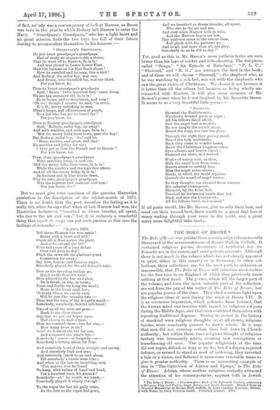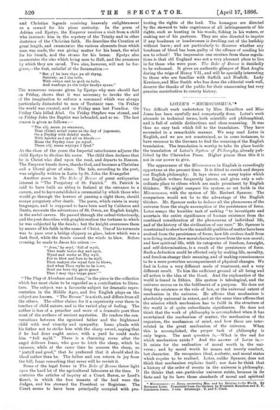THE BOKE OF BROME.*
The Boke of Beome was printed from a man uscript vol u me recently discovered in the muniment-room of Brome Hall, in Suffolk. It contained religious poems, documents of territorial law for domestic use in the manor, and some private accounts. Although there is not much in the volume which has not already appeared in print, either in this country or in Germany, in other col- lections, these collections are, for the most part, so unknown or inaccessible, that The Boke of Brome will introduce most readers for the first time to an England of which they previously knew nothing at first hand. The poems, which fill the larger part of the volume, and form the most valuable part of the collection, are not from the pen of the writer of The Bare of Brome, but are popular poems of the time. They shed a curious light upon the religious ideas of men during the reign of Henry VII. It is an erroneous impression, which polemics have fostered, that the human mind was inactive with regard to religious in i Ijects during the Middle Ages, and that men contented themselves with repeating traditional dogmas. During no period in the history of mankind were religious thoughts, or, at all events, religious fancies, more constantly present to men's minds. It is true that men did not overstep certain lines laid down by Church authority ; but within those lines religions thought or religious fantasy was incessantly active, creating new conceptions or transforming old ones. The popular religionists of the time did not argue, defend, or deny as we do ; but if a dogma required defence, or seemed to stand in need of softening, they invented a tale or a vision, and fathered it upon some venerable name to give it greater authority. There is an interesting example of this in "The Catechism of Adrian and Epotys," in The Boke of Brome. Adrian, whose restless religious curiosity attracted the attention of his contemporaries, appears both in Jewish • The Boke of Brome: a Common-place Book of the Fifteenth Century, containing a Religious Play and Poetry, Legal Forms, and Local Accounts. Printed from as Original Manuscript at Brome Hall, Suffolk, by Lady Caroline Kerrison, Edited, with Notes, by Lucy Toulmin Smith. Privately printed. Md.
and Christian legends receiving heavenly enlightenment as a reward for his pions curiosity. In the poem of Adrian and Epotys, the Emperor receives a visit from a child who instructs him in the mystery of the Trinity and in other doctrines of the Christian faith. He describes the Creation at great length, and enumerates the various elements from which man was made, the sun giving matter for his heart, the wind for his breath, and the stones for his bones. Epotys also enumerates the sins which bring men to Hell, and the penances by which they are saved. Two sins, however, will not be for- given,—the first, unbelief of the Incarnation :—
"But yf he lave thys yn all thyng, Sertenly, as I the telle, With owtyn end be goth to belle, And wanhope ys the todyr brodyr synne."
The numerous reasons given by Epotys why men should fast on Friday, shows that it was necessary to invoke the aid of the imagination to enforce a command which was always particularly distasteful to men of Teutonic race. On Friday the world was created, and ou Friday man lost Paradise. On Friday Cain killed Abel. On Friday Stephen was stoned, and on Friday John the Baptist was beheaded, and so on. The last reason is given as follows :-
" The xiij. resat' ye verament,
That (Criss) Behan came at the day of jugement, On a Fryday with doleful mode, With hander and syd all on bloode ;— Haue the Fryday euer yn mynd.
These xiij. ream] wryttyn I fynd."
At the close of the poem the Imperial catechumen adjures the child Epotys to disclose his name. The child then declares that he is Christ who died upon the rood, and departs to Heaven.
The Emperor kneels down, thanks God, and becomes a Christian and a liberal giver of alms. The tale, according to the poet, was originally written in Latin by St. John the Evangelist
Another poem in The Boke of Bronze of great antiquarian
interest is "The Purgatory of St. Patrick." St. Patrick is said to have built an abbey in Ireland at the entrance to a cavern, and to have established a ceremonial by which those who would go through the horrors of passing a night there, should escape purgatory after death. The poem, which exists in many languages, and is supposed to have been used by Calderon and Dante, recounts the adventures of St. Owen, an English knight, in the awful cavern. He passed through the ordeal victoriously, and the poet describes with graphic realism the tortures to which he was subjected by the fiends ; but the knight overcomes them by means of his faith in the name of Christ. One of his torments was to pass over a bridge slippery as glass, below which was a dark flood, while the fiends caused the winds to blow. Before crossing, he made to Jesus his orison :-
"' Jesn,' he seyd, full of myth, That made bottle day and nyth, Wynd and weder at Thy wyll, For to blow and fore to be styli, Thou makyst the wynd fore to blowe, And whan Thou wylte to be lowe, Send me here thy grete grace That I may thy s bryge pace.' "
" The Play of Abraham and Isaac," is the piece in the collection which has most claim to be regarded as a contribution to litera- ture. The subject was a favourite subject for dramatic repre- sentation in the Middle Ages, and five English plays on the subject are known. " The Brome" is a sixth, and differs from all the others. The editor claims for it a superiority over them in touches of child nature, and in the varied play of feeling. The author is less of a preacher and more of a dramatic poet than most of the authors of ancient mysteries. He renders the con- versations between the agonised. father and the frightened child with real vivacity and sympathy. Isaac pleads with his father not to strike him with the sharp sword, saying that if he had done aught amiss, with a yard he could make him " full myld." There is a charming scene after the angel delivers Isaac, who goes to fetch the sheep, which he caresses, while at the same time be assures the sheep, so " jentyll and good," that he preferred that it should shed its blood rather than he. The father and son return in joy from the hill, Isaac remarking that never will be revisit it.
Some of the legal forms in The Boke of Brome throw light upon the hard lot of the agricultural labourers at the time. It contains the articles of inquiry at a Court Baron, or Lord's court, in which the free tenants of the lord were the Judges, and his steward the President or Registrar. The Court seems to have been principally occupied with pro- tecting the rights of the lord. The homagers are directed by the steward to take cognizance of all infringements of his rights, such as hunting in his woods,•fishing in his waters, or making use of his pastures. They are also directed to inquire if any bondman or bondwoman is dwelling out of the lordship without leave ; and are particularly to discover whether any bondman of blood has been guilty of the offence of sending his son to school! The impression one receives from these regula- tions is that old England was not a very pleasant place to live in for those who were poor. The Buke of Bronz.e is decidedly to be welcomed. It gives an authentic glimpse of East Anglia during the reign of Henry VII., and will be specially interesting to those who are familiar with Suffolk and Norfolk. Lady Kerrison,and Miss Smith who has done the editorial work well, deserve the thanks of the public for their unassuming but very genuine contribution to county history.



































 Previous page
Previous page